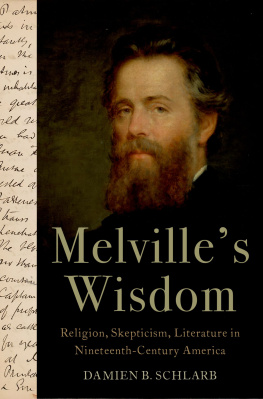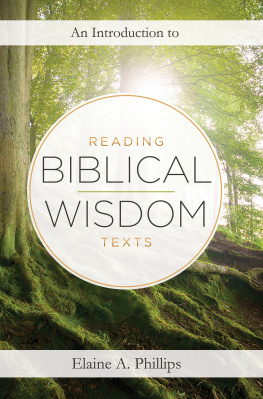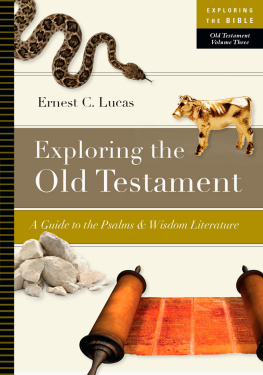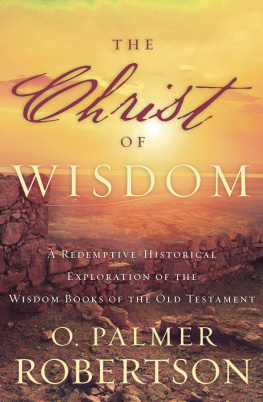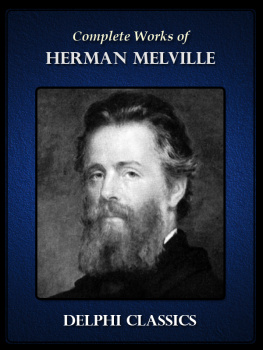Melvilles Wisdom
ACADEMY SERIES
SERIES EDITOR
Margaret D. Kamitsuka
A Publication Series of
The American Academy of Religion
and
Oxford University Press
CROSSING THE ETHNIC DIVIDE
The Multiethnic Church on a Mission
Kathleen Garces-Foley
GOD AND THE VICTIM
Traumatic Intrusions on Grace and Freedom
Jennifer Erin Beste
THE CREATIVE SUFFERING OF THE TRIUNE GOD
An Evolutionary Theology
Gloria L. Schaab
A THEOLOGY OF CRITICISM
Balthasar, Postmodernism, and the Catholic Imagination
Michael P. Murphy
INCARNATION ANYWAY
Arguments for Supralapsarian Christology
Edwin Chr. Van Driel
DISABILITY AND CHRISTIAN THEOLOGY
Embodied Limits and Constructive Possibilities
Deborah Beth Creamer
MEETING GOD ON THE CROSS
Christ, the Cross, and the Feminist Critique
Arnfrur Gumundsdttir
MUSLIMS, SCHOLARS, SOLDIERS
The Origin and Elaboration of the Ibd Immate Traditions
Adam R. Gaiser
RACE AND RELIGION IN AMERICAN BUDDHISM
White Supremacy and Immigrant Adaptation
Joseph Cheah
JOURNEY BACK TO GOD
Origen on the Problem of Evil
Mark S. M. Scott
BEYOND THE WALLS
Abraham Joshua Heschel and Edith Stein on the Significance of Empathy for Jewish-Christian Dialogue
Joseph Redfield Palmisano, SJ
TYPES OF PENTECOSTAL THEOLOGY
Method, System, Spirit
Christopher A. Stephenson
OTHER DREAMS OF FREEDOM
Religion, Sex, and Human Trafficking
Yvonne C. Zimmerman
LIBERALISM VERSUS POSTLIBERALISM
The Great Divide in Twentieth-Century Theology
John Allan Knight
IMAGE, IDENTITY, AND THE FORMING OF THE AUGUSTINIAN SOUL
Matthew Drever
RIGHTEOUS RHETORIC
Sex, Speech, and the Politics of Concerned Women for America
Leslie Durrough Smith
ENFOLDING SILENCE
The Transformation of Japanese American Religion and Art under Oppression
Brett J. Esaki
LONGING AND LETTING GO
Christian and Hindu Practices of Passionate Non-Attachment
Holly Hillgardner
MEANING IN OUR BODIES
Sensory Experience as Constructive Theological Imagination
Heike Peckruhn
INTERPRETING ISLAM IN CHINA
Pilgrimage, Scripture, and Language in the Han Kitab
Kristian Petersen
THE GOODNESS OF HOME
Human and Divine Love and the Making of the Self
Natalia Marandiuc
UNSAYING GOD
Negative Theology in Medieval Islam
Aydogan Kars
TROELTSCHS ESCHATOLOGICAL ABSOLUTE
Evan Kue
MELVILLES WISDOM
Religion, Skepticism, and Literature in Nineteenth-Century America
Damien B. Schlarb

Oxford University Press is a department of the University of Oxford. It furthers the Universitys objective of excellence in research, scholarship, and education by publishing worldwide. Oxford is a registered trade mark of Oxford University Press in the UK and certain other countries.
Published in the United States of America by Oxford University Press
198 Madison Avenue, New York, NY 10016, United States of America.
Oxford University Press 2021
All rights reserved. No part of this publication may be reproduced, stored in a retrieval system, or transmitted, in any form or by any means, without the prior permission in writing of Oxford University Press, or as expressly permitted by law, by license, or under terms agreed with the appropriate reproduction rights organization. Inquiries concerning reproduction outside the scope of the above should be sent to the Rights Department, Oxford University Press, at the address above.
You must not circulate this work in any other form and you must impose this same condition on any acquirer.
Library of Congress Cataloging-in-Publication Data
Names: Schlarb, Damien, author.
Title: Melvilles wisdom : religion, skepticism, and literature in
nineteenth-century America / by Damien Schlarb.
Description: New York, NY : Oxford University Press, 2021. |
Series: AAR academy series | Includes index.
Identifiers: LCCN 2021008106 (print) | LCCN 2021008107 (ebook) |
ISBN 9780197585566 (hardback) | ISBN 9780197585580 (epub) |
ISBN 9780197585597
Subjects: LCSH: Melville, Herman, 18191891Religion. | Bible. Old
TestamentIn literature. | Religion and literatureUnited
StatesHistory19th century. | Religion in literature. | Bible and literature.
Classification: LCC PS2388.R4 S35 2021 (print) | LCC PS2388.R4 (ebook) |
DDC 813/.3dc23
LC record available at https://lccn.loc.gov/2021008106
LC ebook record available at https://lccn.loc.gov/2021008107
DOI: 10.1093/oso/9780197585566.001.0001
For Ian and Svenja with love
Contents
When he was nearing the completion of Moby-Dick in 1850, Herman Melville wrote to his friend the editor Evert Duyckinck, A book in a mans brain is better off than a book bound in calfat any rate it is safer from criticism. And taking a book off the brain, is akin to the ticklish & dangerous business of taking an old painting off a panelyou have to scrape off the whole brain in order to get at it with due safety& even then, the painting may not be worth the trouble. Having finished this book, I can say that retrieving this particular piece from my mental wall and finally being able to exhibit it to the critical eyes of the world was worth the trouble. And while the brushstrokes are my own, taking the painting down has been a collaborative effort.
Several people across numerous institutions and two continents helped bring this book into the world. Foremost among them are Reiner Smolinski and Oliver Scheiding, who co-advised me on my dissertation and continued to lend valuable advice, criticism, and support beyond its completion. Reiner Smolinski at Georgia State University showed me the ropes of academia and eventually became my dissertation director. I worked as his research assistant when he was editing the first volume of Cotton Mathers then-unpublished Biblia Americana, the first Bible commentary created in the American colonies. Aiding him in this work, for me, became a guided tour through Mathers compendious biblical exegesis that laid the foundation for the present book. Reiner remains a mentor and a friend, whose teachings and advice I deeply cherish. Oliver Scheiding, my current chair at Johannes Gutenberg-University in Mainz, is always on hand with constructive feedback and valuable strategic advice. He gave me my first academic position as a doctoral student when I returned from the United States to Germany. His energy, work ethic, and passion drive those around him. I thank him for his trust and support. The other members of my dissertation committee offered invaluable feedback, both practical and scholarly: Mark Noble read several early project and proposal drafts and gave detailed advice on how to get where I was trying to go, even when I wasnt sure about the heading. Paul Schmidt first introduced me to John Henry Newman and showed me how the nineteenth-century crisis in spirituality fostered manifold transatlantic responses.

